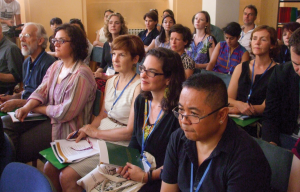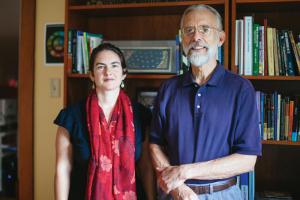
More than two decades after the war that tore apart the former Yugoslavia, the scars remain. Memorials and ruins stand as physical reminders of the conflict that ran for four years in the mid-1990s; less visible are the emotional and psychological wounds that many residents still bear.
It is these latter scars that drew the attention of Katie Mansfield and Barry Hart of Eastern Mennonite University’s (EMU) Center for Justice and Peacebuilding. Mansfield, director of the Strategies for Trauma Awareness and Resilience (STAR) program, and Hart, professor of trauma, identity and conflict studies, helped to plan and participated in an international conference on “Trauma, Memory and Healing in the Balkans and Beyond” in July in Sarajevo, Bosnia and Herzegovina.
The conference, sponsored by the Transcultural Psychosocial Educational Foundation (TPO), had two goals: developing an “archive of knowledge” from the papers presented at the event, and building a network of people who “share ‘best practices’ for psycho-social trauma recovery and the healing of memories,” according to the website.
Mansfield says the goals were largely met, with “a joint effort of scholars, practitioners and activists.”

Mansfield and Hart were on a panel that considered how to integrate psycho-social responses to trauma into peacebuilding work and shared about EMU’s STAR program, which began in 2001 to address the trauma of the September 11 events. Hart also presented a paper titled “Multidisciplinary and Cross Sector Approaches to Building Peace after Complex and Violent Conflicts: The Importance of Psychosocial Trauma and Well-being in this Process.” Mansfield facilitated several workshops on the body’s response to trauma and on using play as a method for getting around “stuck-ness.” She also led a daily period of breathing and meditation exercises.
Beyond the formal presentations, they say the conference included sobering moments, such as a visit to the memorial at the Srebrenica genocide site, and heart-warming ones, including the hospitality shown by a local women’s group that works together across ethnic boundaries. Many issues remain for the region, including high unemployment and other economic challenges, growing insulation of ethnic groups, changing gender roles and differing perspectives on the wartime years.
Mennonite Central Committee (MCC) has a longstanding presence in the Balkans, and EMU has several connections there as well. Those include former seminary faculty members N. Gerald and Sara Wenger Shenk, who served in the former Yugoslavia with MCC, and Amela Puljek-Shank ’00, MA ’04, and Randy Puljek-Shank, MA ’99. Amela, a native Bosnian, is MCC Area Director for Europe and the Middle East and was a keynote speaker at the conference. Since graduating from CJP, the Puljek-Shanks have been creating and facilitating trauma awareness and resilience learning forums throughout the Balkans.
The conference “highlighted the importance of being persistent in continuing to talk about the impact trauma has on generations while also naming that we are not doomed forever due to the traumatic experiences many generations have gone through,” she said. “Resiliency and recovery from trauma are key terms that need to be in the forefront of our conversations. Trauma brings many opportunities for growth and healing. Thus, for us in MCC … supporting our partners across the world in their work, learning how they worked on trauma healing and recovery, and exchanging best practices helps all of us build critical yeast that will eventually lean towards peace.”
This was the second conference held on the topic, and both Mansfield and Hart hope the series continues. They praised TPO program director Zilka Spahić Śiljak, co-organizer of the conference, as “a really impressive and dynamic person” whose energy and vision were instrumental in bringing the event together. The author of Shining Humanity – Life Stories of Women Peacebuilders in Bosnia and Herzegovina, Šiljak teaches at several universities and is currently doing research at Stanford.
“I think it was the right conference as part of the next step,” Hart says. “It’s a building process. I really trust that they’ll take this forward in a dynamic, meaningful way, and we want to be as much a part of that as possible.”
“It’s exciting to think how CJP may be involved in helping to deepen those capacities that are already so powerfully there,” Mansfield adds.
The collection of conference papers is expected to be available in English by early 2017.